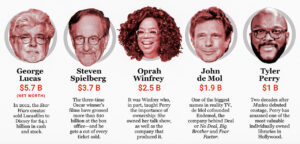
Tyler Perry may have graduated to a new tax bracket, but don’t write him off so soon. In fact, join me in celebrating the accomplishments of a Black man— who once had to figure out where he’d lay his head at night, but now has nine figures trailing behind his net worth.
According to the Foundation for Economic Education, the concept of greedy billionaires hoarding wealth is merely a myth as acquired funds are said to be philanthropically invested in small businesses and banks.
Others who argue for rich Americans stockpiling money believe these fortunes are well-deserved or even predestined.
On the other side of the aisle, anti-billionaire sentiment is justified by the Institute for Policy Studies’ analysis of the widening wealth gap.
As coronavirus continues to cripple economies worldwide by terrorizing low-income communities and working-class people, the billionaires of the world are sitting pretty.
Though a valid sentiment, Perry isn’t your Jeff Bezsos, Steve Jobs or Donald Trump— whose father graced him with “a small loan of $1 million dollars.”
The playwright, whose dreams were once bigger than his wallet, never let his foot off the gas.
“I love it when people say you come from ‘humble beginnings’,” he told Forbes Magazine. “[It] means you were poor as hell.”
For the past 15 years, we’ve gathered around TVs and sold out theaters in commemoration of Perry’s 1,200+ episodes of television, 22 feature films and at least two dozen plays.
Perry uses his talent to tell the stories millions of Black and brown men and women know all too well.
He illustrated the systemic strongholds stacked against Black men, more specifically Black fathers, through the character Monty in “Daddy’s Little Girls.”
He showed the struggle of silently weeping single mothers, battered beauties toting their traumas like Birkin bags and the millions of women who wade in the waters in between through his films like “Diary of a Mad Black Woman”, “I Can Do Bad All By Myself” and “For Colored Girls.”
Notably, he brought to life characters like Madea— our favorite hood heroine— who gifted Black America with what we didn’t know we needed: relatable stories and laughter to keep us from crying.
Perry’s biggest contribution is more important than some dollar amount on check and stretches far beyond the big screen.
As Generation Z came to realize, ownership is a true symbol of wealth. In 2015, Tyler Perry Studios found its birthplace in the real Black Hollywood: Atlanta, GA.
TPS exists as a manifestation of our ancestors’ wildest dreams, taking “40 acres and a mule” to new heights.
Perry took the faithlessly promised 40 acres, multiplied it by eight and added on an extra 10 as a late fee. The 330-acre lot has created nearly 29,000 jobs and graces the list of largest production facilities in the country, according to its website.
At the 2019 BET Awards, Perry discussed how TPS sits atop former army base Fort McPherson. The same land where Confederate soldiers plotted “to keep 3.9 million negroes enslaved,” Perry said. “Now that land is owned by one negro.”
A Black boy burdened by the wounds of an abuse-ridden upbringing grew up to be a Black man defying the systematic laws and limitations set to ostracize him by this “Land of the Free”— and we’re rooting for him. Period.
In a country where Black men are at the top of the endangered species list, “billionaire status” doesn’t go down as just a milestone for Perry, but a win for us all; one worthy of celebration.
Let it be known to give Tyler Perry his flowers today, tomorrow and to tack on a few dozen extra for the ones we might’ve neglected to deliver so many yesterdays ago.